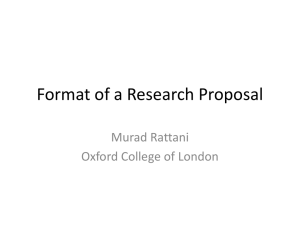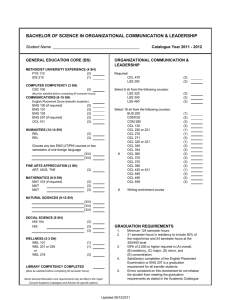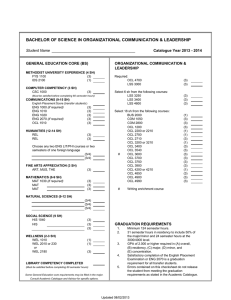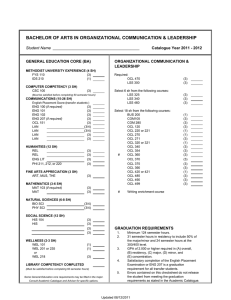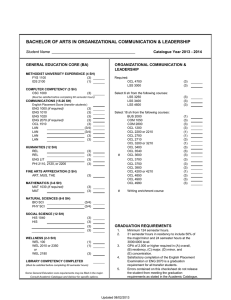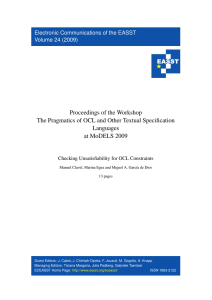APPLIED COMMUNICATION (OCL) WRITING ACROSS THE CURRICULUM PLAN December 12, 2014—Bill Watt
advertisement
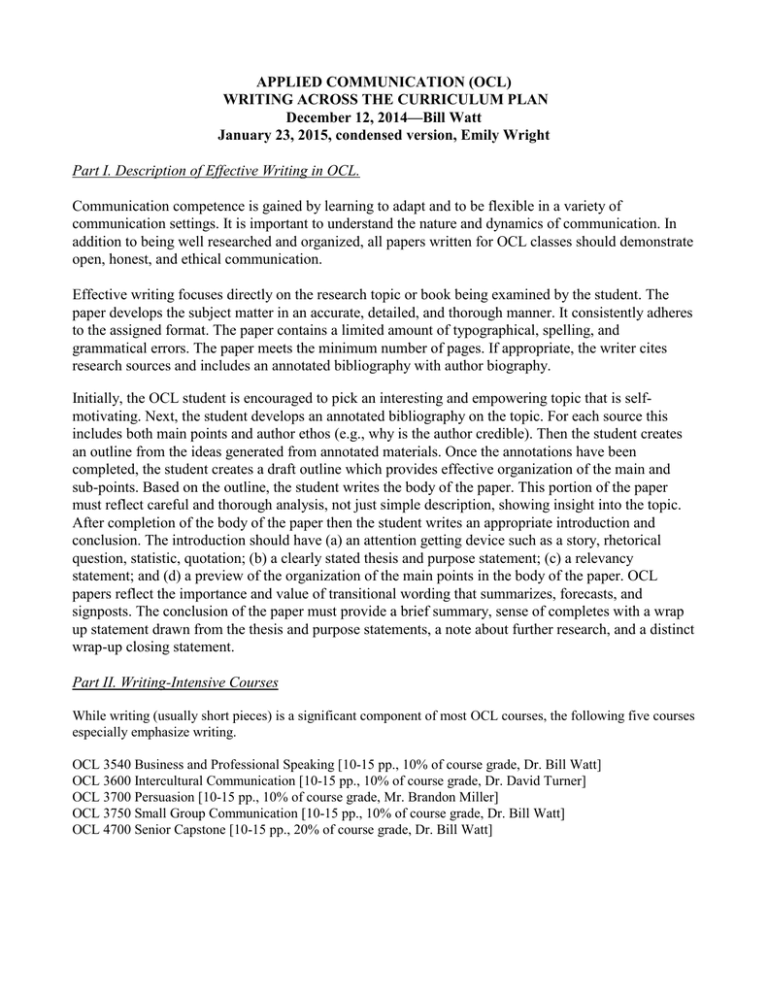
APPLIED COMMUNICATION (OCL) WRITING ACROSS THE CURRICULUM PLAN December 12, 2014—Bill Watt January 23, 2015, condensed version, Emily Wright Part I. Description of Effective Writing in OCL. Communication competence is gained by learning to adapt and to be flexible in a variety of communication settings. It is important to understand the nature and dynamics of communication. In addition to being well researched and organized, all papers written for OCL classes should demonstrate open, honest, and ethical communication. Effective writing focuses directly on the research topic or book being examined by the student. The paper develops the subject matter in an accurate, detailed, and thorough manner. It consistently adheres to the assigned format. The paper contains a limited amount of typographical, spelling, and grammatical errors. The paper meets the minimum number of pages. If appropriate, the writer cites research sources and includes an annotated bibliography with author biography. Initially, the OCL student is encouraged to pick an interesting and empowering topic that is selfmotivating. Next, the student develops an annotated bibliography on the topic. For each source this includes both main points and author ethos (e.g., why is the author credible). Then the student creates an outline from the ideas generated from annotated materials. Once the annotations have been completed, the student creates a draft outline which provides effective organization of the main and sub-points. Based on the outline, the student writes the body of the paper. This portion of the paper must reflect careful and thorough analysis, not just simple description, showing insight into the topic. After completion of the body of the paper then the student writes an appropriate introduction and conclusion. The introduction should have (a) an attention getting device such as a story, rhetorical question, statistic, quotation; (b) a clearly stated thesis and purpose statement; (c) a relevancy statement; and (d) a preview of the organization of the main points in the body of the paper. OCL papers reflect the importance and value of transitional wording that summarizes, forecasts, and signposts. The conclusion of the paper must provide a brief summary, sense of completes with a wrap up statement drawn from the thesis and purpose statements, a note about further research, and a distinct wrap-up closing statement. Part II. Writing-Intensive Courses While writing (usually short pieces) is a significant component of most OCL courses, the following five courses especially emphasize writing. OCL 3540 Business and Professional Speaking [10-15 pp., 10% of course grade, Dr. Bill Watt] OCL 3600 Intercultural Communication [10-15 pp., 10% of course grade, Dr. David Turner] OCL 3700 Persuasion [10-15 pp., 10% of course grade, Mr. Brandon Miller] OCL 3750 Small Group Communication [10-15 pp., 10% of course grade, Dr. Bill Watt] OCL 4700 Senior Capstone [10-15 pp., 20% of course grade, Dr. Bill Watt] Part III. Rubrics used in courses. A. OCL 3540 Business and Professional Speaking; OCL 3600 Intercultural Communication; OCL 3700 Persuasion; OCL 3750 Small Group Communication. Grading Rubric for Student Papers [10% of final course grade]: Category 1. Organization of critique, spelling, and grammar = 20% 2. Typing/formatting paper instructions = 10% 3. Meet critique length criteria = 10% 4. Annotated Bibliography = 10% 5. Content Analysis of Speech/Speaker = 50% B. OCL 4700 [senior OCL capstone course] Grading Rubric for Student Papers [paper counts for 20% of final course grade]: Category Point Value 1. Organization of critique, spelling, and grammar 20 points 2. Typing/formatting paper instructions 30 points 3. Meet critique length criteria 30 points 4. Content Analysis of Speech/Speaker 120 points Total = 200 points
